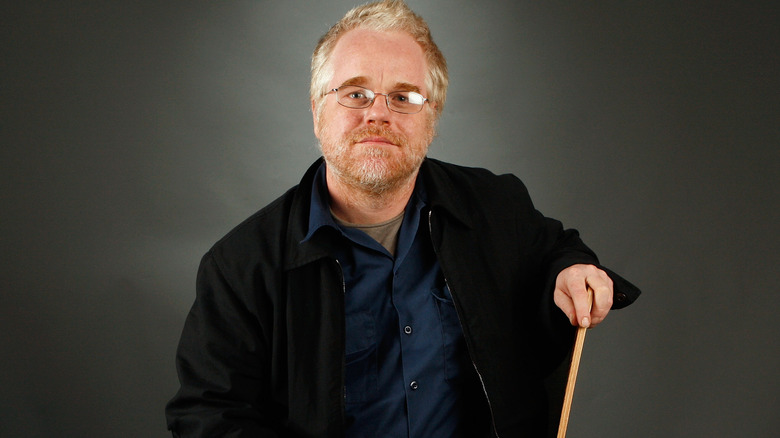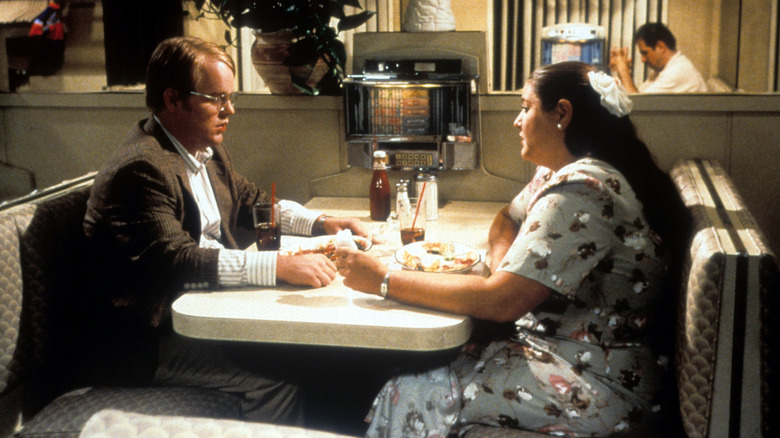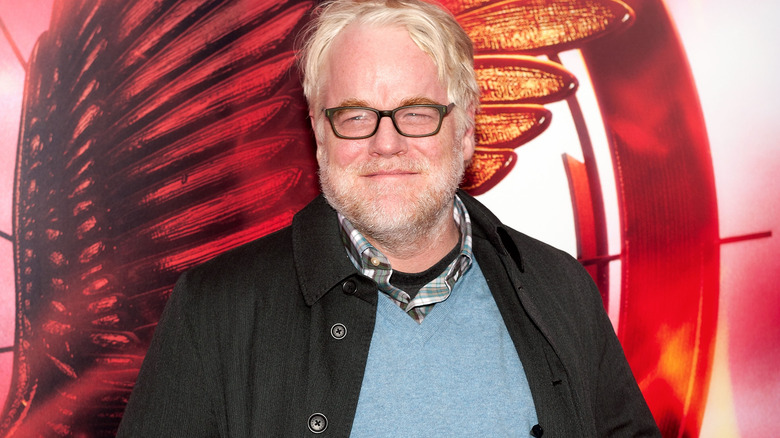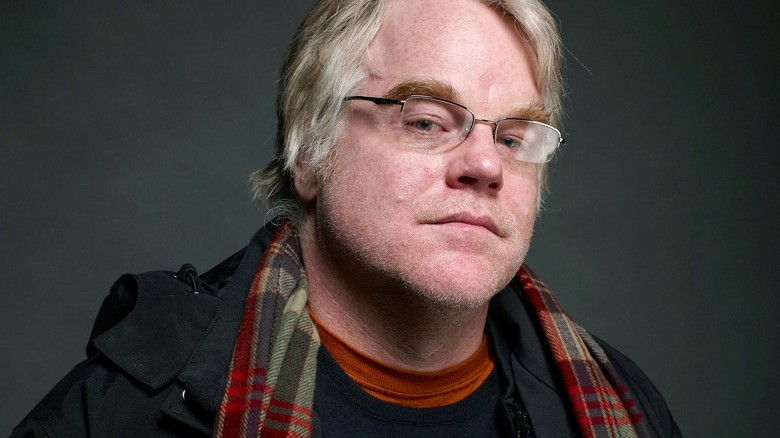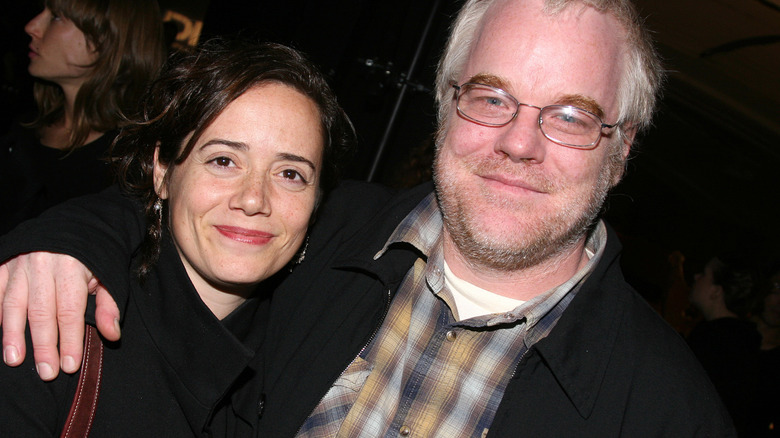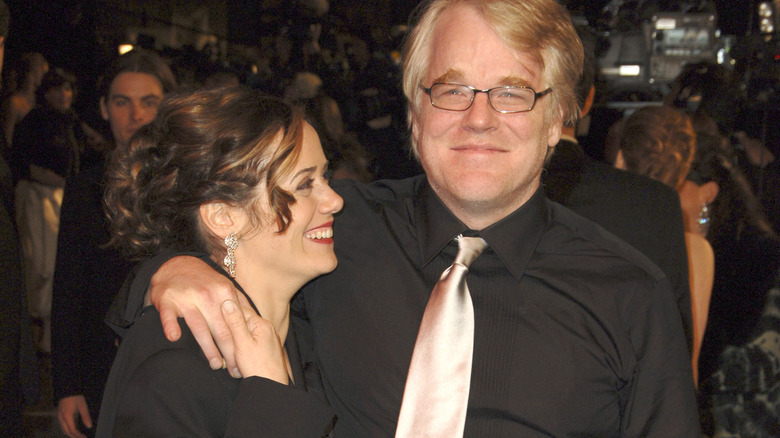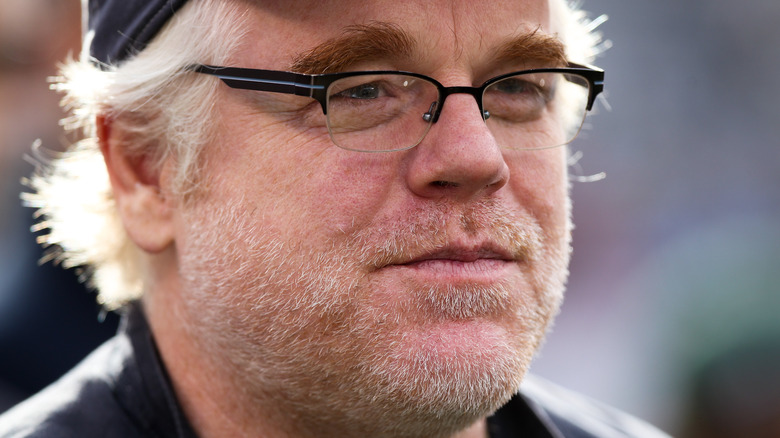Philip Seymour Hoffman's Tragic Real-Life Story
It's no secret that when it comes to acting, there are all different kinds of skill levels. While ranking those and sharing some examples isn't on today's to-do list, it's safe to say that when it comes to the shockingly brilliant, Philip Seymour Hoffman needs to be named. Just look at his performance as Truman Capote. In a conversation at the Doha Film Institute's Qumra conference (via The Playlist), director Bennett Miller said:
"When I think back on it, I think it was totally insane. Capote was 5'2, Phil was 5'10, weighed about 240 lbs, and had a deep voice, thick wrists like a wrestler or a football player — like a jock. He did have the right color hair, though. But he was an amazing actor." And that, at the end of the day, is more important than a passing physical resemblance.
When he passed away at a tragically young age, his death seemed to come out of left field. There's actually a reason for that: In an interview with the Independent, Hoffman shared a bit about why he was notoriously private: "I'd rather not [talk about them] because my family doesn't have any choice. If I talk about them in the press, I'm giving them no choice. So I choose not to." While that means there's a lot that's just not known about his personal life, there are some things that have come to light — and some have been shared by the family he protected all those years.
A severe injury ended his ability to play sports
When "Capote" director Bennett Miller explained to attendees at the Qumra conference that one of the reasons Philip Seymour Hoffman had been a physically unlikely choice to play Truman Capote, he cited Hoffman's wrestler-like build. It turns out that's not random, and in an interview with The Sydney Morning Herald, Hoffman spoke a little bit about growing up in a small town on the outskirts of Rochester, New York, and confirmed that yes, for some of his teenage years, he wasn't just a sports enthusiast, but a wrestler.
"It's something I enjoyed, something I wasn't bad at, but something I never really advanced far enough to know if I could be really good at it," he explained. Why? He went on to say that when he was 14 years old, he suffered a catastrophic injury that happened when someone had him in a half-nelson, leaned on him, and separated several vertebrae. "The wrestling injury sidelined me from sports," he said.
Hoffman has also hinted at just how much the injury continued to plague him, and it's not surprising: A spinal injury, after all, is for life. He told NPR that he had nearly ended up needing surgery, and doctors told him that another, similar injury would have been devastating. Even though he didn't end up needing to go under the knife, he added that it impacted him and his abilities for the rest of his life.
He spoke about the emotional burden he struggled with as an actor
There are as many different techniques as there are actors, and while Philip Seymour Hoffman may have made stepping into some pretty dark characters look pretty effortless, an interview with NPR suggests that there may have been more going on behind the scenes than fans knew and that the effort of portraying some of those dark characters and even darker moments was something that weighed heavily on him.
Hoffman was a bit taken aback by asking if he struggled with the acting process, and finally admitted, "I think that the amount of concentration, sometimes the amount of personal exploration it takes to do something well, can be not pleasant, you know, like hard work is. ... I wear that on my sleeve sometimes when I'm working." After discussing the safe spaces created by "Cold Mountain" director Anthony Minghella, he added, "You know, I think I do wear that discomfort of sometimes the process, that the creative process of something, and how sometimes it's not pleasant on my sleeve."
For him, it was the long hours, and the relentless need to inhabit another character. He called it emotionally exhausting to explore the deepest, darkest depths of a character, and when he was asked if he had gone to therapy to help him deal with the weight of it all, he deflected: "I've never been to therapy for acting. ... That would be my answer, though... You know what I mean?"
His death came at the incredibly young age of 46
By the time many people are 46 years old, they're really just getting into the swing of life. When Philip Seymour Hoffman died in 2014 at 46 years old, it was the sort of headline that seemed to come out of left field. He had an amazing career, he was widely lauded for his talents, and then? The unthinkable.
His obituary in The New York Times reported that he had been discovered in his Greenwich Village office, along with drug paraphernalia and what appeared to be a packet of heroin. The report also mentioned a part of his life that perhaps few people realized was as all-encompassing as it may have been, acknowledging previous interviews where he had mentioned his struggles with alcohol and drug addiction.
His body was discovered by a concerned friend, David Bar Katz. "I saw him last week, and he was clean and sober, his old self. I really thought this chapter was over," he was quoted as saying. Hoffman's death put an uncomfortable spotlight on something else, too: Marion Downey of the National Drug & Alcohol Research Centre at UNSW Sydney wrote a piece on the knee-jerk reaction that came in the reports around his death. There was plenty of speculation, guesswork, and rumors, and she wrote that it illustrated on a massive scale just how poorly and how unfairly addiction was understood and reported by the media.
He spoke publicly about early struggles with addiction
After his death, CBS News looked back on an interview that he had done in 2006. In a conversation with "60 Minutes," he spoke about how he had struggled with addiction when he was in his early 20s. "It was anything I could get my hands on. I liked it all," he said. He was candid, too, about saying that although there was a period where he thought he was the one in control, he reached a point where he recognized that needed help.
Hoffman said that he had initially had a difficult time with it, but said that he had realized there were so many things that he wanted to do with his life. He knew that going through rehab was the way to make that all happen, but he was also honest about the fact that the addiction always had the potential to resurface.
He explained it in an interview with NPR, saying that he absolutely didn't resent people who were able to have a glass or two of wine and enjoy the evening. To him, he didn't think there was anything to resent, because alcohol just wasn't pleasurable for him. "People who don't have a problem with alcohol don't have a problem with alcohol. You know, they have their couple glasses of wine, and they go on their way. You know what I mean? And that's just the way it is. I'm just not one of those people."
His longtime partner provided heartbreaking insight into his relapse
Addiction doesn't just exist in a bubble, it impacts entire families. After Philip Seymour Hoffman's death, his longtime partner Mimi O'Donnell wrote a heartfelt piece for Vogue that explained some of the things that he had kept private during his lifetime, including some difficult thoughts on the struggles leading up to his relapse, and how she dealt with it.
She wrote that there had been a number of things that had sort of piled on the stress: In addition to struggling to deal with acting and the pressure of increasing fame, O'Donnell says that there were two massive blows. Hoffman had been a regular attendee of AA meetings, and she said that there had been some kind of falling-out with his friends there. Even as that support system collapsed, she said that he was also devastated when his longtime therapist passed away after being diagnosed with cancer.
She wrote that he had been clean and sober for around two decades, and when he asked her what she thought about him having a drink, it had filled her with dread. From alcohol, it was into prescription opioids, and in spite of doing another stint in rehab, she said his addictions continued. She wrote, "I had been expecting him to die since the day he started using again, but when it finally happened it hit me with brutal force. I wasn't prepared. There was... just ferocious pain and overwhelming loss."
His addiction had a devastating impact on his family
In her heartbreaking piece for Vogue, Philip Seymour Hoffman's longtime partner Mimi O'Donnell wrote, "How do I tell my kids that their dad just died? What are the words?" O'Donnell wrote of the struggles she faced as she tried to help him, at the same time she felt as though she needed to prioritize keeping their children away from the worst of his addiction. They ultimately decided that after he started using again, he would move into a nearby apartment. From there, it was into rehab, and O'Donnell said that he still spent quality time with the kids, then five, seven, and 10 years old.
And that's made even more tragic by how close they were as a family. It's no secret that actors might end up away from home, filming in distant locations for months on end, but O'Donnell said that they were never apart more than two weeks at a time. Even when he was going to be shooting somewhere and unable to get away, he'd just insist that everyone join him.
"When I look back at how close we all were, I wonder whether Phil somehow knew that he was going to die young. He never said those words, but he lived his life as if time was precious. Maybe he just knew what was important to him and where he wanted to invest his love. I always felt there was plenty of time, but he never lived that way."
His family has spoken about the painful effects of his death
For those who lose loved ones — no matter what the circumstances — death is only the beginning. Nothing is ever the same, and for many, the grief is always there. Survivors are faced with a new normal, and in her piece for Vogue, Philip Seymour Hoffman's longtime partner, Mimi O'Donnell, wrote about how it was only knowing that their children needed her that kept her getting up in the morning. She wrote, too, of how deeply they were impacted by his death.
"They were keenly aware that I was now their only parent, and Willa, my youngest, obsessed about it, asking, 'If you die, how are people going to know how to find us?' It was almost a year before I could go out at night without the kids going into a panic."
It wasn't just their relationship with their mother that was colored by the shadow of loss, and O'Donnell told a story that illustrates in a perfect yet terrible way just how deeply loss impacts a family. She wrote about how — several years after his death — she agreed that they could welcome a puppy into their family. It should have been an unconditionally joyous occasion, but she wrote that her oldest observed, "She's going to die. Dogs don't live very long, so we're going to see her die." O'Donnell wrote, "In her birth and in her coming to us, we were also mourning her death. ... That's who they are now."
If you or anyone you know needs help with addiction issues, help is available. Visit the Substance Abuse and Mental Health Services Administration website or contact SAMHSA's National Helpline at 1-800-662-HELP (4357).
